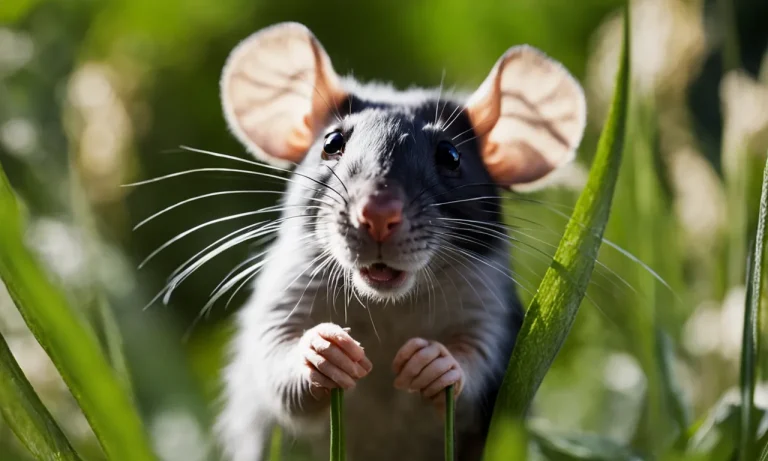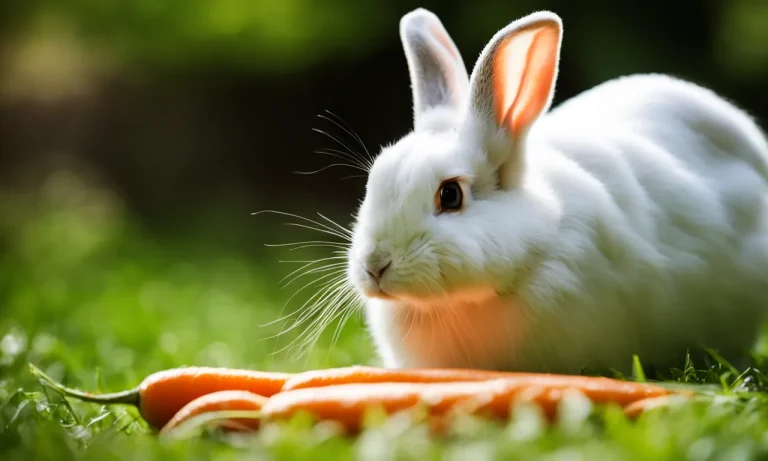Rabbits are some of the cutest and most lovable pets around. Their soft fur and twitchy noses endear them to many animal lovers. If you’re considering getting a bunny, you may be wondering: do bunnies love their owners?
The short answer is yes, bunnies can form strong bonds with their human caretakers.
In this comprehensive guide, we’ll dive into the details on bunny bonding, affection signs, proper care and handling for optimal bonding, and tips to build a loving relationship with your rabbit.
Signs That Bunnies Love Their Owners
Bunnies Seek Out Their Owners for Companionship
Bunnies are social animals and they seek companionship, so if your bunny is constantly seeking you out, it’s a good sign that they love you. They may hop over to you, nudge you with their nose, or even jump up on your lap to be close to you.
This behavior shows that they enjoy your presence and feel comfortable around you.
Bunnies Groom Their Owners
Grooming is an important part of bunny social behavior, and if your bunny starts grooming you, it’s a clear sign of affection. Bunnies groom each other to bond and show their love, so if your bunny starts grooming your hand, hair, or clothing, consider yourself lucky!
It means they see you as part of their family and want to take care of you.
Bunnies Lick Their Owners
While it may come as a surprise, bunnies show their love by licking their owners. Licking is a behavior that bunnies use to show affection and to groom each other. If your bunny starts licking you, it’s a clear sign that they love and trust you.
It’s their way of saying “I care about you” in their own unique way.
Bunnies Follow Their Owners Around
If your bunny follows you around the house, consider it a sign of love and devotion. Bunnies are naturally curious creatures and they like to explore their surroundings, but if they choose to stick close to you wherever you go, it’s a sign that they feel safe and secure in your presence.
It also shows that they enjoy your company and want to be near you.
Proper Bunny Care for Bonding
Give Them Plenty of Exercise and Playtime
When it comes to bonding with your bunny, exercise and playtime are essential. Bunnies are naturally active animals, and providing them with plenty of opportunities to hop, run, and play will not only keep them physically fit but also help strengthen the bond between you and your furry friend.
A great way to do this is by setting up a designated play area where your bunny can explore safely. You can fill it with tunnels, toys, and even create obstacle courses for them to navigate. Spend time interacting with your bunny during playtime, using toys to encourage them to run and jump.
This will not only keep them entertained but also show them that you are a source of fun and enjoyment.
Pet and Brush Them Frequently
Bunnies love to be groomed, and regular petting and brushing sessions can be a wonderful bonding experience. Not only does it help keep their fur clean and healthy, but it also allows you to spend quality time together.
Use a soft brush to gently stroke your bunny’s fur, paying attention to areas they enjoy being scratched, such as behind the ears or under the chin. This can be a calming and soothing experience for your bunny, and they will associate these positive feelings with your presence.
Hand Feed Treats
One way to build trust and strengthen the bond with your bunny is by hand feeding them treats. Bunnies love food, and by offering them their favorite treats directly from your hand, you are creating a positive association with your presence.
Start by offering small pieces of fresh fruits or vegetables, such as carrots or apple slices, and gradually work your way up to more interactive feeding sessions. This will not only help your bunny see you as a source of delicious food but also provide an opportunity for gentle interaction and bonding.
Hold and Cuddle Your Bunny
While not all bunnies enjoy being held, many can be trained to feel comfortable in your arms through gentle and patient handling. Start by getting your bunny used to being touched and lifted by offering treats and praise.
Once they are comfortable, you can gradually progress to holding them for short periods. Remember to always support their hind legs and keep a firm but gentle grip. Cuddling your bunny close to your chest and speaking softly to them can create a sense of security and warmth.
It’s important to note that not all bunnies will enjoy being held, so it’s essential to respect their boundaries and find other ways to bond if they prefer.
By following these tips for proper bunny care and bonding, you can create a strong and loving relationship with your furry companion. Remember to be patient, understanding, and always respect your bunny’s individual personality and preferences.
With time and effort, you can build a bond that will bring joy and happiness to both you and your bunny.
Creating a Loving Bond With Your Bunny
Spend Time with Your Bunny Every Day
Building a strong bond with your bunny starts with spending quality time together. Bunnies are social animals and enjoy the company of their owners. Set aside time each day to interact with your bunny, whether it’s through playtime, grooming, or simply sitting together.
This will help your bunny feel loved and secure in your presence.
Speak Softly and Gently
Bunnies have sensitive ears and can be easily startled by loud noises or aggressive tones. When interacting with your bunny, speak softly and gently to create a calm and soothing environment. Use a high-pitched, sweet voice to communicate with your bunny, as this is more likely to elicit positive responses.
Remember, a calm and relaxed bunny is a happy bunny!
Bunny Proof Your Home
Bunnies are naturally curious creatures and love to explore their surroundings. To ensure the safety of your bunny and protect your belongings, it’s important to bunny-proof your home. This involves removing any potential hazards such as wires, toxic plants, or small objects that your bunny could chew on or swallow.
By creating a safe environment, you can provide your bunny with the freedom to roam and play without worry.
Learn Your Bunny’s Body Language
Bunnies communicate their feelings through body language. By learning to understand their cues, you can better respond to their needs and strengthen your bond. For example, a relaxed bunny will have a loose body posture and may flop onto their side or back.
On the other hand, a bunny that feels threatened or scared may flatten their ears against their back or thump their hind legs. By observing and responding appropriately to your bunny’s body language, you can create a sense of trust and understanding.
For more information on bunny care and building a loving bond with your furry friend, you can visit www.rabbit.org. Their website offers a wealth of resources and expert advice to help you become the best bunny owner you can be.
Signs of a Stressed or Unhappy Bunny
While bunnies are generally known for their playful and affectionate nature, it is important for owners to be aware of the signs that may indicate their bunny is feeling stressed or unhappy. Recognizing these signs early on can help address any issues and ensure your bunny’s well-being.
Here are some common signs to look out for:
Aggression or Biting
If your bunny starts displaying aggressive behavior or begins biting, it could be a sign of stress or unhappiness. Bunnies may become aggressive if they feel threatened or if they are in pain. It’s important to observe their body language and identify any triggers that may be causing this behavior.
Seeking advice from a veterinarian or a rabbit behavior specialist can help address and manage this issue effectively.
Destructive Chewing Behaviors
Bunnies have a natural instinct to chew on things, but excessive destructive chewing can be a sign of stress or unhappiness. If you notice your bunny chewing on furniture, electrical cords, or other inappropriate items, it may be a cry for attention or a sign of boredom.
Providing your bunny with appropriate chew toys, regular playtime, and mental stimulation can help redirect their chewing behavior and keep them happy and entertained.
Excessive Hiding
If your bunny spends an excessive amount of time hiding or avoids interaction with you or other family members, it may indicate that they are feeling stressed or unhappy. Bunnies are prey animals by nature and may retreat to their hiding spots if they feel threatened or insecure.
Creating a safe and comfortable environment for your bunny, providing hiding spots, and giving them plenty of positive experiences can help reduce their stress levels and encourage them to come out of their shells.
Lack of Appetite
A sudden or prolonged decrease in appetite can be a concerning sign in bunnies. It may indicate that they are feeling unwell, stressed, or unhappy. Bunnies are known for their voracious appetite, so any changes in their eating habits should be taken seriously.
If your bunny refuses to eat or has a significant decrease in food intake, it is important to consult a veterinarian to rule out any underlying health issues.
Remember, each bunny is unique, and their behavior can vary. It is essential to pay attention to your bunny’s individual personality and habits to understand their needs better. If you have concerns about your bunny’s well-being, consulting a veterinarian or a rabbit behavior specialist is always a good idea.
Conclusion
While bunnies may not show affection in exactly the same ways as dogs or cats, they are capable of forming strong bonds with their owners through proper care, handling, and quality time spent together.
By understanding bunny body language, providing a safe home, and interacting positively with your rabbit each day, you can develop a loving companionship with your furry friend for years to come.






